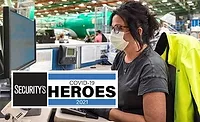Special Report // 2021 Women In Security
Moving From Restriction to Acceptance and Collaboration
Lisa Oliveri, Director of Global Safety and Security, Education Development Center

Bio Image courtesy of Oliveri
Background image / Stígur Már Karlsson /Heimsmyndir / E+ / via Getty Images
Lisa Oliveri’s career in security happened organically. She was pursuing a career in science and medicine, of all things, when she was first exposed to crisis response and incident reporting as a resident assistant of a dormitory. Later on, after teaching for a bit and while pursuing a degree in international relations with her eye on the nonprofit sector, Oliveri was assigned a special project for a nonprofit she was working with. Essentially, that project turned into building out the organization’s first ever safety and security program.
In part, Oliveri’s passion for making a difference, helping others, and working in the nonprofit sector all come together as a security leader. “It really resonates with me that the work has a direct impact on people’s safety and security. Whatever the organization’s mission is, we try to do it as safely as possible and that is very rewarding work,” she reflects.
Oliveri says that early on in her career, she found the general perception of security as a mission hindrance or restrictive function, to be a big motivator. The idea fueled her to create a different culture for what security can and should look like within an organization.
Now, as Director of Global Safety and Security at Education Development Center, headquartered in Waltham, Mass., a global nonprofit with more than 1,300 employees that focuses on projects to improve education, promote health and expand economic opportunity, Oliveri oversees all global safety and security operations with the goal of acceptance and collaboration in mind.
“Because so much of our work is done in ongoing conflict zones, our approach to security involves a great deal of communication with local and national communities, elders, tribal leaders and others. We want the support of the communities we go into and that’s a huge part of how we approach safety and security,” she says.
But, she says, COVID-19 has dramatically altered both the immediate environment and the risk landscape, posing a huge challenge going forward. “I think everyone is focused on the pandemic and what international travel resumption and returning to work will look like,” she says. “There are many new working environment challenges with significantly higher work-from-home populations, including insider threats, cybersecurity challenges, mental health and domestic violence issues. The challenge becomes that duty of care and how to fulfill that.”
Oliveri credits much of her career success, particularly in leadership roles, to the mentors and peers she has networked with and built relationships with over the years. “I don’t think I would be where I am now in terms of my position had I not had an opportunity to be a part of associations, networking and mentoring. It has had an enormous impact on my career,” she says.
Her accomplishments, professional development, and involvement within associations and security industry groups are just as impressive as her role as a director of security. Because of her experiences, Oliveri tries to give back to others in the industry and encourages other women in security to move up the ranks and have confidence in what they can offer their organization and the security sector.
Through her volunteer leadership positions, Oliveri hopes to facilitate discussions, events and information sharing among peers, as well as encourage and champion others in their career pursuits. She is the past co-chair of the ASIS International Young Professionals Community and an active member of the ASIS Women in Security community. She is the chair of the U.S. State Department’s Overseas Security Advisory Council (OSAC) International Development Sector Committee (IDSC), and was appointed as the first female Chair of the ASIS International Chief Security Officer (CSO) Center Board.
“Hearing thoughts and opinions from other security leaders has been so essential to my own development,” she says. “Talking through challenges helps you to be forward-thinking, agile and innovative and it helps you make connections with people that might be able to help each other.”
In fact, for the past several years, Oliveri has worked to raise awareness and increase representation of non-profit security professionals in security associations and at global security conferences and events. She believes there is significant value gained from engaging with and networking with leaders from other sectors. “Diversity of thought and different security approaches and cultures are so valuable to keep in mind, even if you don’t adopt those specific strategies. It’s about knowing they exist and making those connections,” she says.
Looking for a reprint of this article?
From high-res PDFs to custom plaques, order your copy today!








